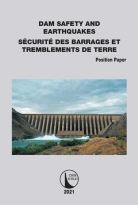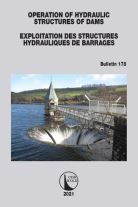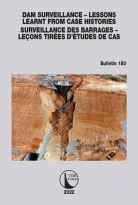Publications

World Register of Dams / Registre Mondial des Barrages
Achat d'un accès de 3ans pour le Registre Mondial des Barrages (RMB).
Le RMB est la meilleure base de données répertoriant des barrages dans le monde et nous travaillons constamment à son amélioration
Registre des barrages
La meilleure base de données mondiale sur les barrages, établie à partir des inventaires nationaux envoyés par les pays membres à la CIGB. Le Registre est mis à jour continuellement et comporte actuellement plus de 55 000 Barrages.
Événements

92ème Réunion Annuelle et Symposium Int'l
New Delhi, Inde
27 Sept. - 3 Octobre 2024
.jpg)
ANCOLD Conference 2024: Never the same dam twice
Adelaide, Australie
11 - 14 Novembre 2024
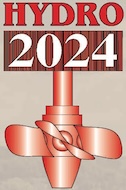
HYDRO 2024 Secure technology for turbulent times
Messe Congress Graz (MCG), Autriche
18 au 20 Novembre 2024
Voir le site web dédié (en anglais seulement)

17e atelier international de référence de la CIGB sur l'analyse numérique des barrages
Sofia, Bulgarie
9 - 12 Avril 2025

28ème Congrès & 93ème Réunion Annuelle de la CIGB
Chengdu, Chine
15 Mai au 23 Mai 2025

XXIe conférence internationale sur le contrôle technique des barrages
Cracovie, Pologne
09 - 12 Septembre 2025
Voir le site web (en anglais)
After the floods, from Red Cross to heads of state, a general call for more dams, November 12th
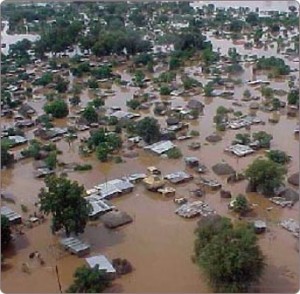
Anti-dams movements tend to forget the human cost of having no dams to protect the populations against deadly floods. Recent natural catastrophies in Nigeria and India has led some key people to express their support for building more dams.
The grim reality of the massive flooding witnessed in Nigeria early October has provoked a general call for building more dams to provide flood protection.
Because of the floods, Nigeria is now on the verge of a major food crisis, with rice and yam – especially production falling far below expectation. The massive floods have washed away many farmlands where staple foods, such as rice, maize, yam, are being grown.
Farmlands in Benue, Kogi, Niger, Kwara, Adamawa, Kano, Kebbi, Plateau and Edo have been washed away.
President Goodluck Jonathan in his home state – Bayelsa – which is virtually under water, said the Federal Government would build more dams to prevent flooding.

Nigeria President Goodluck Jonathan
He also hinted of the plan to import seedlings for farmers who have been affected by the floods and said: “So, what government can do is to make sure that we build more dams in the Benue system. At present, we are building the Kasambila Dam that will be completed in 2014 and even that one , my commitment is to fast track it to make sure we discuss with the contractor, even if we will pay more money.
“By the time we build two or three more dams in the Benue section and the Niger river , we may still get more water coming in, but it will not be to this level because the dams hold the water and release it gradually.”
The Red Cross takes stand for dams
The Nigeria Red Cross Society strikes the same point. Its Lagos State chapter called on the Federal Government to construct more dams in order to check the rising spate of flood disasters in the country. Mrs Ijeoma Nweke, the Branch Secretary to the society, said in an interview with the News Agency of Nigeria (NAN) in Lagos that “the recent floods that were overwhelming some parts of the country and destroying lives and properties worth billions of naira could be averted if the right infrastructure was put in place”
The floods have left 148 people dead and affected 21 of the nation's three dozens states, according to the Red Cross.
“Torrential downpours in recent weeks have caused widespread destruction and forced many families into makeshift camps,” the aid agency said "An estimated 134,000 people have now been affected by the floods and concern is growing about the spread of waterborne diseases."
Mrs Ijeoma Nweke noted that the tragedy could be averted if the right infrastructure was put in place.
Africa is not the only place where dams are wished to In the Northeastern State of Arunachal Pradesh, Governor JJ Singh is advocating the building of dams to solve the perennial problem of floods. After meeting with his Meghalaya counterpart RS Mooshahary, he declared to the press :
“We should look for a long term solution to the problem of floods in the region. I am of the opinion to regulate and control floods by measures of construction of dams.”
Anti dam activists in the region especially Assam have been opposing the Lower Subansiri Hydroelectric Power (LSHP) project in Arunachal Pradesh.
“Certain anti-dam NGOs made certain statements against construction of dams. They should explain today whether opposing construction of dams would help in some cases or would it not help if water is controlled and regulated when such heavy rains take place,” the Arunachal Pradesh Governor asked. An excellent request indeed !
Tags : Events


